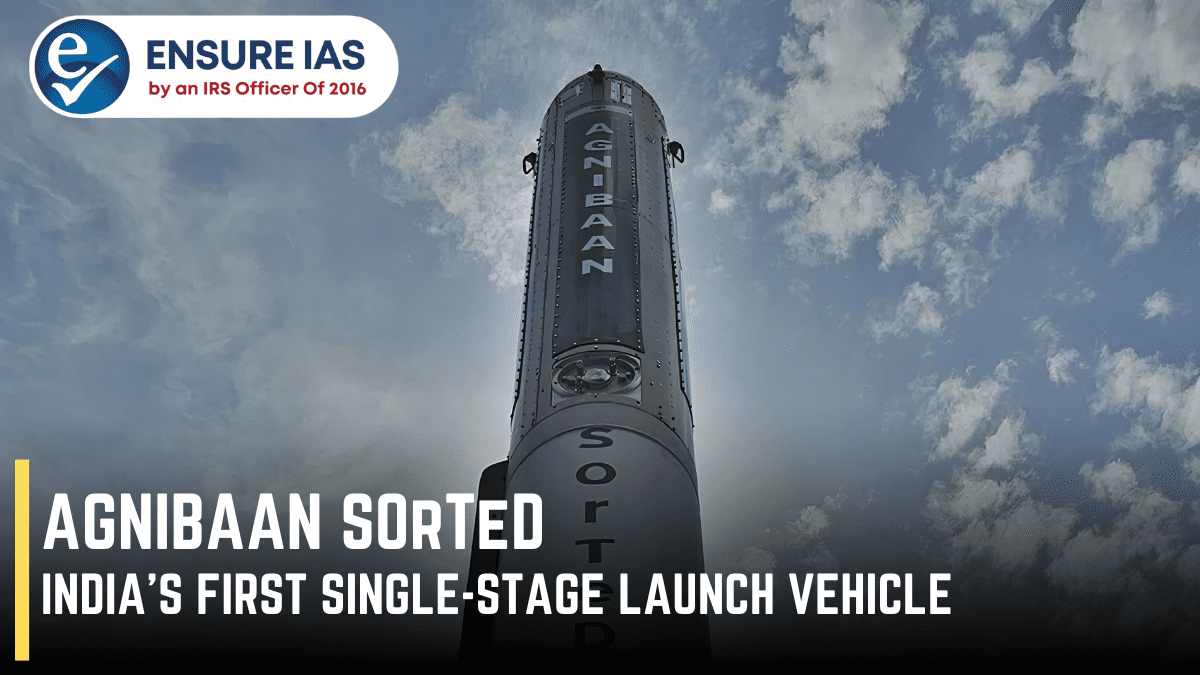- Courses
- GS Full Course 1 Year
- GS Full Course 2 Year
- GS Full Course 3 Year
- GS Full Course Till Selection
- Answer Alpha: Mains 2025 Mentorship
- MEP (Mains Enrichment Programme) Data, Facts
- Essay Target – 150+ Marks
- Online Program
- GS Recorded Course
- Polity
- Geography
- Economy
- Ancient, Medieval and Art & Culture AMAC
- Modern India, Post Independence & World History
- Environment
- Governance
- Science & Technology
- International Relations and Internal Security
- Disaster Management
- Ethics
- NCERT Current Affairs
- Indian Society and Social Issue
- NCERT- Science and Technology
- NCERT - Geography
- NCERT - Ancient History
- NCERT- World History
- NCERT Modern History
- CSAT
- 5 LAYERED ARJUNA Mentorship
- Public Administration Optional
- ABOUT US
- OUR TOPPERS
- TEST SERIES
- FREE STUDY MATERIAL
- VIDEOS
- CONTACT US
AGNIBAAN SOrTeD: INDIA'S FIRST SINGLE-STAGE LAUNCH VEHICLE
AGNIBAAN SOrTeD: INDIA'S FIRST SINGLE-STAGE LAUNCH VEHICLE
08-04-2024

- AgniKul Cosmos, an IIT Madras incubated space start-up based in Chennai, has once again postponed the launch of its Agnibaan SOrTeD.
- This single-stage launch vehicle, powered by AgniKul's patented Agnilet engine, is a significant milestone in India's space program.
Features of Agnibaan SOrTeD
- Agnibaan SOrTeD is equipped with the Agnilet, India's first semi-cryogenic engine, developed indigenously.
- The rocket engine will burn kerosene-liquid oxygen and can be directly used in the rocket, making it highly efficient.
- It stands 18 meters tall and is 1.3 meters in diameter, with a lift-off mass of 14,000 Kgs.
- It can carry a 100-kg payload up to a height of 700 km.
- It will also include India's first Ethernet-based avionics architecture and completely in-house developed autopilot software.
- To ensure its compatibility with multiple launch ports, AgniKul has designed a launch pedestal called 'Dhanush'.
Significance of Agnibaan SOrTeD
Agnibaan SOrTeD is an important development in India's space program for several reasons:
- It is the first single-piece 3D-printed semi-cryogenic rocket engine in the world.
- It will be launched from India's first private launchpad, ALP-01, located inside ISRO's Sriharikota spaceport.
- It can access both low and high inclination orbits, making it a versatile launch vehicle.
- It is also designed for launch from more than 10 different launch ports, providing greater flexibility.
With Agnibaan SOrTeD, AgniKul Cosmos is set to revolutionize India's space industry and contribute to the country's growing space capabilities.
FAQs:
Q1: What is the Indian National Space Promotion and Authorization Centre (IN-SPACe)?
- The Indian National Space Promotion and Authorization Centre (IN-SPACe) is an independent agency that supports the participation of private players in the space sector.
- It was established in 2020 and is headquartered in Ahmedabad, Gujarat.
- IN-SPACe is an autonomous agency under the Department of Space (DOS).
IN-SPACe's functions include:
- Linking ISRO and private sector companies
- Evaluating demands of private sector companies
- Finding ways to attune demands, in consultation with ISRO
- Making binding decisions on both ISRO and private sector organizations
- Promoting and developing Indian space ecosystem
- Enabling and nurturing NGEs to accomplish their ventures in space sector
- Authorizing space operations and services in the country through well-defined framework
- Supervising the space activities of NGEs in the country



